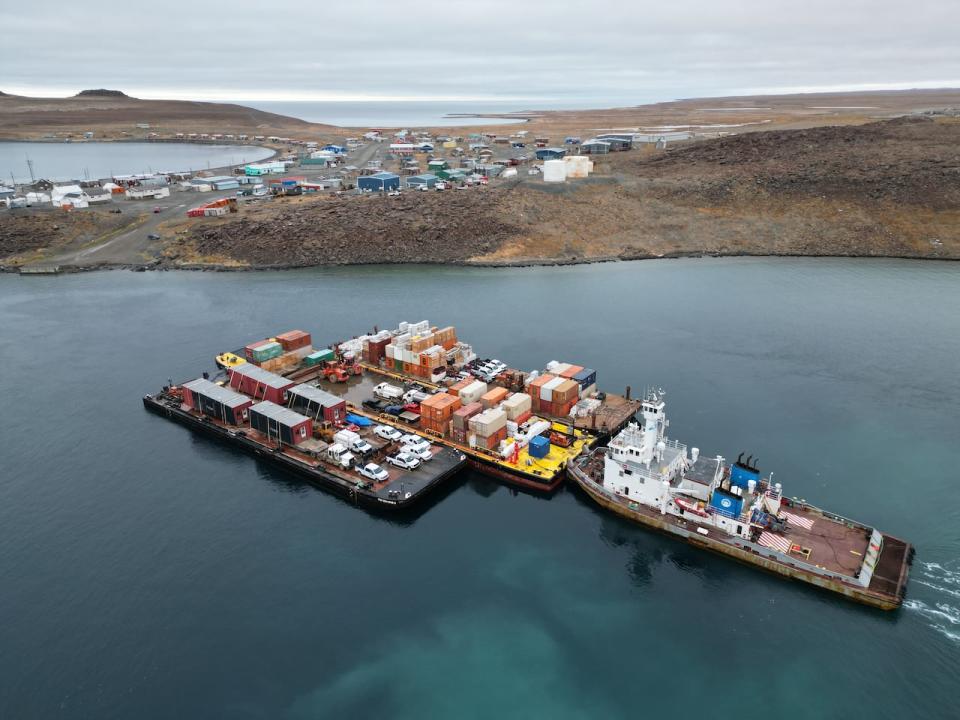Norman Wells, N.W.T., is running out of aviation fuel

The town of Norman Wells, N.W.T., is running low on aviation fuel — forcing some airlines to make adjustments and possibly throwing a wrench in people's holiday travel plans.
Pascal Audet, the town's deputy mayor, says it's because low water on the Mackenzie River this year, along with the summer wildfires, disrupted the normal shipment of fuel to the community.
"It was kind of a double whammy there of of natural disasters so to speak, and that caused us not to get resupplied correctly," Audet said.
"And here we are now, we've got a shortage of jet fuel now because of that."
Norman Wells is about 700 kilometres northwest of Yellowknife and not accessible year-round by road, so many local supplies are shipped by seasonal barge on the Mackenzie — including aviation fuel. A winter road to the community is not yet open for this year, and it's not expected to open to large trucks for several more weeks.

A resupply barge arrives in Ulukhaktok, N.W.T., in September. While that vessel managed to make its deliveries, late season barges to Tulita and Norman Wells, N.W.T., were cancelled due to low water in the Mackenzie River. (N.W.T. government)
The shrinking supply of aviation fuel came as a surprise last week to North-Wright Airways, a regional airline that's based in Norman Wells. Company president Travis Wright said he was notified by email on Dec. 7.
"It was quite a shock," Wright said.
"Obviously our core business is here in Norman Wells, and we need fuel for airplanes to operate throughout the Sahtu region, and down to and from Yellowknife."
Wright said the fuel supplier, Imperial Oil, told the affected airlines that fuel would be rationed in Norman Wells until the winter road is open to allow for resupply to the community.
North-Wright's ration is not nearly enough to maintain its regular service, Wright said. That means the company's planes need to carry more fuel from Yellowknife, and therefore less cargo or fewer passengers.
"Everyone's traveling, has more stuff. People are visiting families, getting ready for the Christmas holiday season — and you know, they don't need this," Wright said.
"We're losing and bleeding money daily, for us losing charters that we have already had booked that we cannot do."
According to Wright, it's a problem that could affect any airlines that fly in the N.W.T. and Yukon, if they go to Norman Wells or even use it as an alternate location for refueling. Those airlines will have to adjust their schedules too, he said.
Devin Lyall, chief pilot of Yellowknife-based Summit Air, agreed that the fuel shortage in Norman Wells came as a "total shock," and that it's already having an impact on business. The airline typically delivers groceries to communities in the Sahtu, and refuels in Norman Wells.
"We now have to tanker more fuel out of the Yellowknife which, you know, we can only take so many pounds of fuel or cargo. So the more fuel we have to take, the less freight we get to take," Lyall said.
Groceries will still get to the communities, he said, but it may require more flights.
"We're still going to find a way to get them there, but they might take a little longer than before," he said.
In an emailed statement to CBC News, an Imperial Oil spokesperson said the company was aware of the issue in Norman Wells.
"We notified our sole customer, World Fuel Services, who provides fuel to the airlines in Norman Wells," the statement reads.

The Imperial Oil plant in Norman Wells in July 2022. The company says it is meeting with local officials to 'discuss interim solutions until the winter roads open.' (Liny Lamberink/CBC)
"Norman Wells can't be serviced by traditional supply chain methods until the winter roads open so alternate sources of supply are currently being explored. Imperial is meeting with local leaders and government to discuss interim solutions until the winter roads open."
Infrastructure department 'facilitating meetings'
Tracy St. Denis, assistant deputy minister with the territory's department of infrastructure, said the Marine Transportation Service (MTS) was able to get three out of four barges to Norman Wells this year, with a million litres of aviation fuel, but the last barge didn't make it.
"So as I understand it, what we have now is a bit of a gap between the aviation fuel they have on hand and then what will get resupplied," she said.
St. Denis said the territorial government also just found out about the problem a little over a week ago.
"At this point, we've seen ourselves playing a key role in facilitating some discussions between industry aviation companies and the Sahtu leadership," St. Denis said.
"We're assisting with facilitating meetings."
Travis Wright, of North-Wright Airways, said he understands why there's a fuel shortage in Norman Wells, because of what happened this summer with the wildfire evacuations and the historic low water levels on the Mackenzie.
He questions why there wasn't more notice.
"This should have been known. It should have let everyone know in September and not a 12-hour notice before they shut all fuel off from the people using it," Wirght said.
"At the end of the day, we can't wait for the winter road to open to make things all OK. We need fuel. We need fuel now, to start moving people of this region ... to have this land on our lap, it's not good. It's not good at all."

